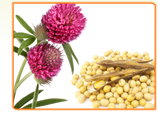What Are Isoflavones?
 Isoflavones. The word recently seems to be synonymous to "mysterious" and "unknown". You may have heard the word mumbled, muttered furtively along with "phytoestrogen", sidling into web pages on "soy", and tentatively associated with "menopause symptoms". What exactly are these enigmatic isoflavones? What do these words mean? And how do they relate to each other?
Isoflavones. The word recently seems to be synonymous to "mysterious" and "unknown". You may have heard the word mumbled, muttered furtively along with "phytoestrogen", sidling into web pages on "soy", and tentatively associated with "menopause symptoms". What exactly are these enigmatic isoflavones? What do these words mean? And how do they relate to each other?
Read on to dispel the mystery surrounding isoflavones; discover how they might be found, and the truth about how they can help ease your menopause symptoms, and their other health benefits.
What Are Isoflavones?
Isoflavones are a type of natural organic compound. They are produced in some plants, particularly by members of the fabaceae (bean) family. They act as phytoestrogens, which means that they mimic the role of human estrogen. Their chemical structure is very similar to that of human estrogen, and when introduced into the body, they can boost or balance hormone levels.
What Are Common Sources of Isoflavones?
Isoflavones can be found many products, but they are most commonly found in soy and products derived from this. Soy isoflavones can be found in:
• Miso
• Tofu
• Tempeh
• Soy beans
• Soy germ
How do Isoflavones Affect My Menopause Symptoms?
 During menopause, as your body prepares for the cessation of the menstrual cycle, estrogen and progesterone levels fluctuate, and eventually fall into decline. The flux of hormones in your body is what causes unpleasant menopausal symptoms, such as hot flashes, night sweats, headaches, fatigue and a loss of libido.
During menopause, as your body prepares for the cessation of the menstrual cycle, estrogen and progesterone levels fluctuate, and eventually fall into decline. The flux of hormones in your body is what causes unpleasant menopausal symptoms, such as hot flashes, night sweats, headaches, fatigue and a loss of libido.
Isoflavones, which are comparable to human hormones, can supplement your body's estrogen levels. They can help to counter-balance high estrogen levels, or act as a supplement when levels are running low. By balancing the fluctuations made by your menopausal hormones, and they ease the uncomfortable symptoms you might be experiencing.
What Are Other Health Benefits of Isoflavones?
Isoflavones do not just affect your body's hormone levels, but can have other significant health benefits:
Reduce the risk of cancer
It is thought that the reaction of isoflavones within the body can help reduce the chance of cancerous cells forming in the bladder, breast, colon, prostrate and skin.
Reduce the risk of fracture and osteoporosis
Soy isoflavones help facilitate the movement of calcium from the bloodstream into the bone. This strengthens the bones and increases their resistance to fracture, as well as helping to prevent osteoporosis.
Reduce the risk of diabetic retinopathy
Diabetic retinopathy is an eye disorder which can affect sufferers of diabetes. Soy isoflavones contain a substance called genistein which helps combat against diabetic retinopathy.
Unveiling the mystery of the isoflavone can unlock the hidden door to combating the uncomfortable symptoms of your menopause.
Click the following link for more information about herbs for menopause support, and how to incorporate them into your diet.



























